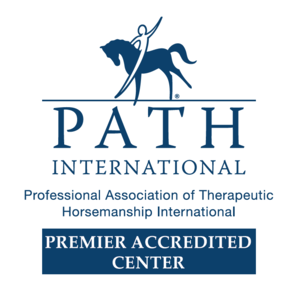“I get very excited and look forward to going horseback riding every Saturday morning. I like trotting on the horse in the arena. I used to really enjoy looking at all the horses before the virus started.” Shamez is among the 10+ percent of Little Bit adaptive riders who live in adult family homes. For many adults with disabilities, their lives changed dramatically in 2020. Shamez moved back home with his parents and has taken a leave from the job he held at Starbucks for 15 years.
Firoz, Shamez’s father and a retired pediatrician, noticed shortly after birth that he faced significant challenges. His rare syndrome affects fine and gross motor movement, global development, verbal communication, visual perception, strength, and posture. Having experienced the benefits of therapeutic riding in California, dad Firoz and mom Shamim quickly found Little Bit after moving to the Seattle area in 1992, when Shamez was nine years old. Today, Shamez works with adaptive riding Instructor Devon.
According to Firoz, “[Little Bit is] one thing he always looks forward to. He’s very much in tune with nature. It helps him so much—he was not walking very straight. His posture improved, he walks upright, and he has gotten stronger. At the same time, he also started talking more—he opened up. He still waits for Saturday for that one hour.”
Devon has been Shamez’s Little Bit Instructor for two years, though she has known him for five. Together they work on one of Shamez’s goals to navigate the arena at the walk/trot in a group setting without assistance from his volunteer leader, Ellen, all while riding Little Bit’s largest horse, Harvest, at 17.2 hh. Shamez’s narrow field of vision and depth perception makes this a challenging goal, and Shamez rises to the occasion. Devon gets creative setting up obstacles with cones and poles, while taking into account her students’ abilities. One day, while navigating a challenging course, Shamez and Harvest got turned around, and Shamez responded humorously, “You know, all those cones look the same.” Another goal is to continue more advanced trot work. His unmounted goals will have to wait until COVID limitations have lifted.
Firoz and Devon agree that Shamez is a man of few words. Devon shared, “Shamez is very insightful and aware of what’s happening in the arena. When Shamez is with the horses, I see a more extroverted personality than when he’s on the ground. . . . He’s able to engage with people more when he has horses as a buffer.”
Given Harvest’s background with the Seattle Police Department’s Mounted Patrol Unit, it may come as a surprise that during a recent trail ride around the Little Bit track, Harvest saw a deer and panicked, frozen in place with nostrils pointed up. Instructor Devon knew the bond between Shamez and Harvest, so she asked Shamez if he would like to dismount. With another rider and another horse, Devon would have made the decision to dismount rather than ask the question. Recognizing that Harvest was scared, Shamez responded, “No, I think we just need to give him love and tell him to be brave.” As they walked past the deer, Shamez continued to show empathy and caring for Harvest who eventually relaxed.
This is just one example of Shamez’s compassion for Harvest and the other horses he has ridden. Devon shared, “He can tell you something about all of his horses.”
Routines and activities outside the home are vital to the health, happiness, and independence of adults with disabilities—and their caregivers. Right now, for many adaptive riders, Little Bit is the only weekly activity outside their home, presenting both an honor and a great responsibility for Little Bit.
Written by Sharon Soldenwagner
Photo credit: Jessica Farren Photography








